According to the findings of IEP’s Global Terrorism Index 2025, the Sahel now accounts for 51 per cent of worldwide terrorism deaths – a notable increase from the 1 per cent it represented seventeen years ago.
The Sahel, comprising parts of Burkina Faso, Cameroon, Chad, The Gambia, Guinea, Mali, Mauritania, Niger, Nigeria, and Senegal, has experienced a significant increase in terrorism. Deaths from terrorism have increased nearly tenfold since 2019. In 2024, conflict deaths in the region exceeded 25,000 for the first time since the inception of the GTI, with terrorism accounting for 4,794 of these fatalities. Five of the ten countries most impacted by terrorism globally are now located in the Sahel. 17 out of the 20 deadliest terrorist attacks in 2024 occurred in Sub-Saharan Africa. In the Sahel region, the deadliest terrorist attack was in Burkina Faso on June 11th, when JNIM gunmen killed at least 110 soldiers and 60 civilians and kidnapped an unconfirmed number of others.
As the Sahel’s security architecture has been changing, foreign intervention dynamics have undergone significant reconfiguration, with traditional powers reducing presence and new actors increasing influence in the region.
France has maintained a presence across its former colonial territories in the Sahel for decades. Paris’s response to extremism involved deploying troops across the region but ultimately faced challenges due to local opposition and strategic limitations. According to ICEWS and IEP calculations, France has decreased in popularity across many of its former colonies in the Sahel region, with 59 percent of Malians holding negative views about France. The most significant shifts in negative sentiment are evident in Mali and Burkina Faso. When these countries are combined with other former French colonies (Guinea, Ivory Coast, Benin, Togo, Senegal and Mauritania), data demonstrates a clear increase in negative sentiment. However, without Mali and Burkina Faso included, the levels of negative sentiment are considerably lower. Anti-colonial sentiment has emerged in West Africa and has been utilized by military leaders governing both Mali and Burkina Faso. These patterns may extend beyond the Central Sahel states.
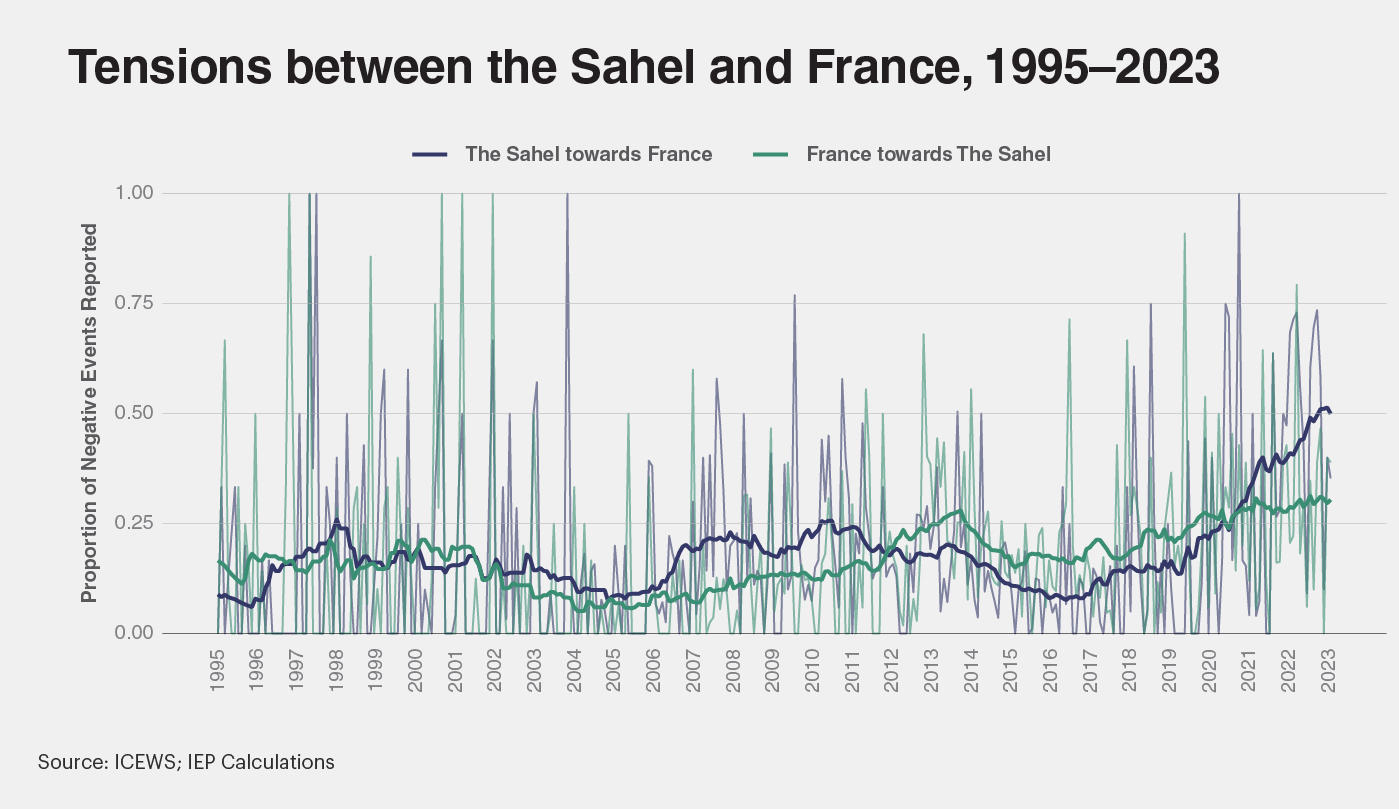
Gallup polling indicates changing attitudes toward major powers throughout the Sahel region. Both Russia and the United States have experienced increased approval in much of the area since 2019. Favourable views toward Russia have grown by 33 per cent in Burkina Faso, with less pronounced but significant increases across other Sahelian countries, apart from Guinea, where approval decreased by six percent. Support for the United States has also expanded in numerous countries, although it has declined in Burkina Faso and Mali by nine per cent and 15 per cent, respectively. The Gambia stands as the only country where support for both powers has diminished, with Russian support falling by 16 percent and US support dropping by 10 percent.
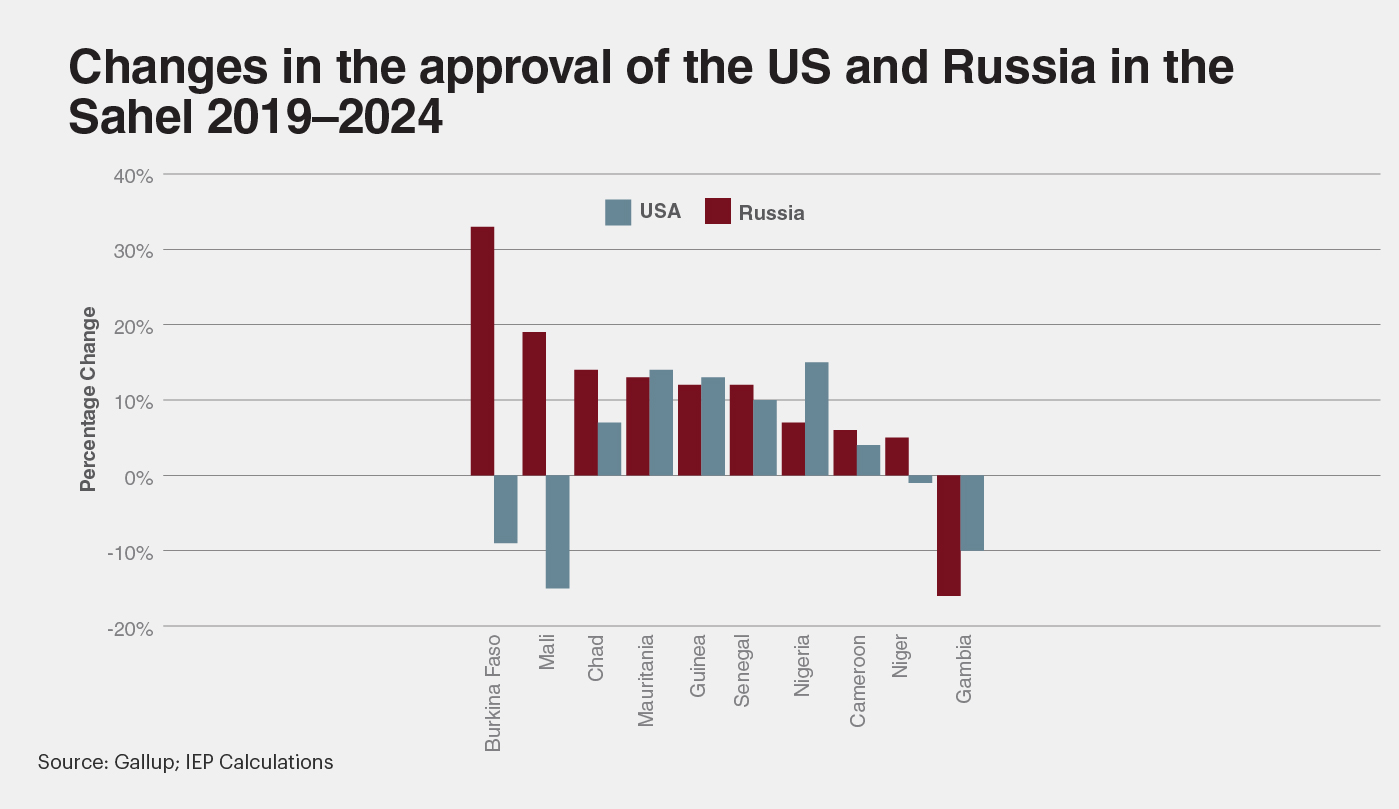
GTI Country Rank: 4 (4th country most impacted by Terrorism)
604 dead in 2024 from Terrorism
Since 2012, numerous French-supported security interventions have been deployed in Mali. These include an EU Training Mission, French-directed counterterrorism campaigns (including Operation Serval, Operation Barkhane and the Takuba Initiative), and the United Nations Multidimensional Integrated Stabilization Mission in Mali (MINUSMA). Additionally, the G5 Sahel Initiative and other independent security actions, including the participation of private organisations, have been launched to address regional instability. These efforts have had limited success, and sentiment toward France has changed. The perceived effectiveness of these missions in improving the security environment contributed to the view that France was primarily concerned with its own interests rather than Mali’s needs.
The military transitions in Mali during 2020 and 2021 altered security partnership dynamics. Under Colonel Assimi Goita’s leadership, Mali has adopted what it describes as a ‘sovereigntist’ governance strategy, attempting to reduce foreign influences it considers problematic. This approach has received support from segments of the population, particularly younger citizens dissatisfied by international actors’ ability to resolve the security crisis. This situation relates partly to the French intervention model, which emphasised direct engagement with professional military personnel over providing training, addressing military corruption, or strengthening local forces’ capabilities. The change in sentiment is illustrated in the chart showing the proportion of media articles in Mali expressing negative views about France following the first coup in 2020
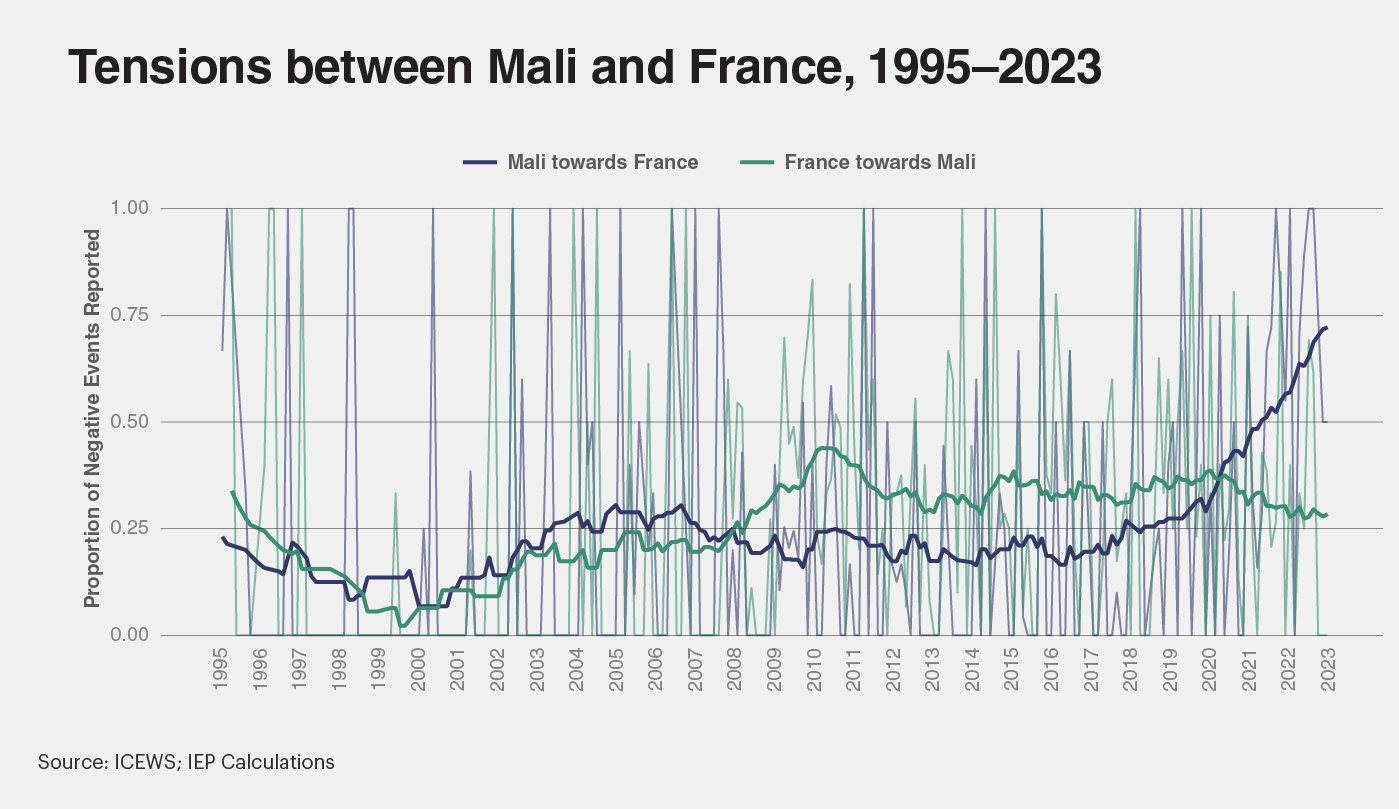
Regional security changed significantly following the 2022 departure of French forces from Operation Barkhane. Security provision responsibilities transferred from French to Malian Armed Forces, with assistance from pro-government militias and the Russian Africa Corps (formerly Wagner Group). Despite Barkhane’s limited success in securing Mali, it had maintained control near major urban centres while working with UN MINUSMA peacekeepers. Currently, many of these areas face attacks from JNIM and IS-Sahel.
The UN Security Council ended MINUSMA’s mission in Mali in June 2023 after the Malian government withdrew its support. MINUSMA, established in 2013, encountered challenges providing security beyond its base locations due to operational territories and infrastructure limitations. The withdrawal of peacekeepers, completed in December 2023, coincided with increased violent conflicts in areas previously secured by UN forces.
The data displays MINUSMA base positions and conflict events throughout Mali since UN forces withdrew. Conflicts for control of former UN installations developed, involving Malian forces, Africa Corps personnel, Tuareg rebels, and JNIM. The November 2023 conflict in Kidal represented significant fighting between government and rebel forces since the 2015 peace agreement. This accord ended in January 2024, leading to increased conflict across northern Mali.
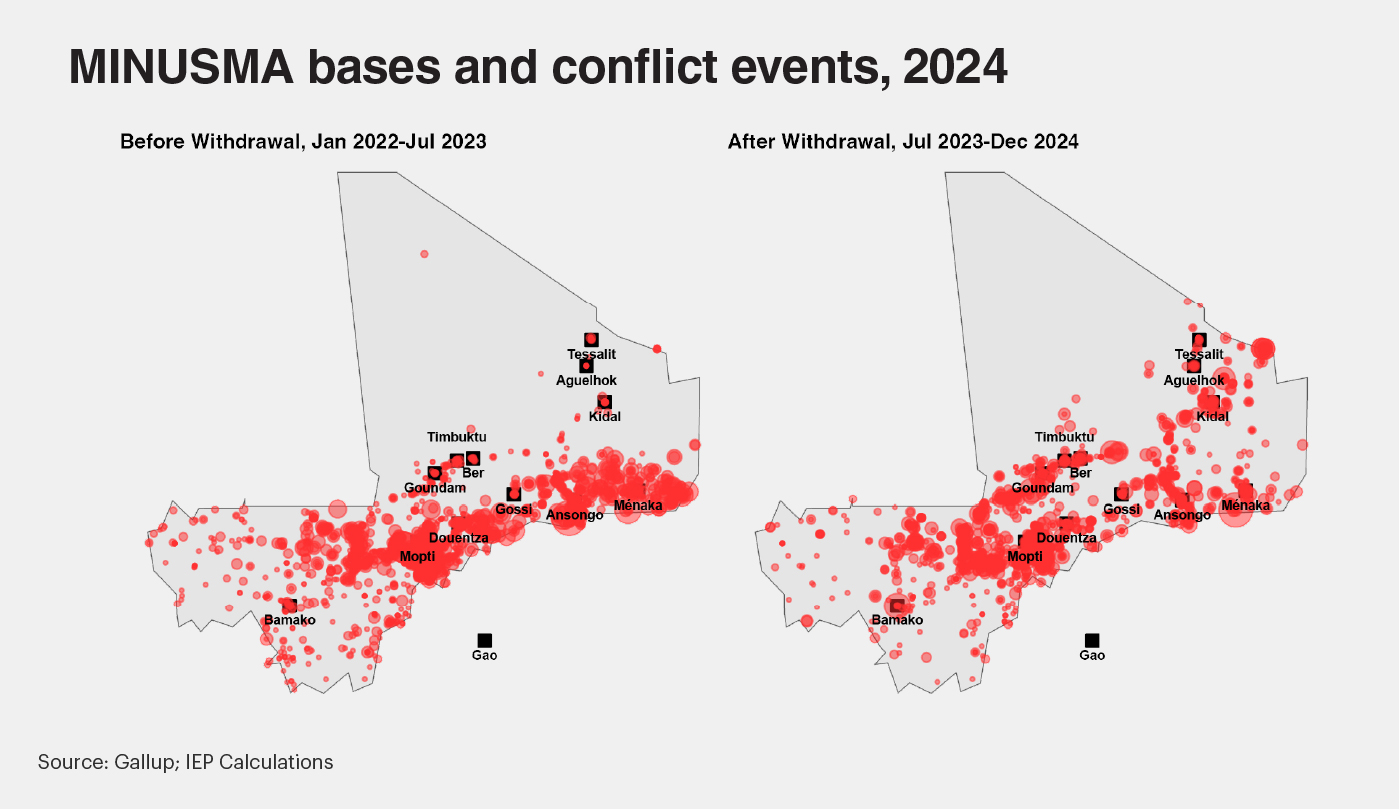
Russian involvement in Mali has grown considerably. Through their private military contractor Africa Corps (formerly Wagner Group), the Russian government deployed to Mali in December 2021, operating alongside Malian forces in counterterrorism operations. Russian PMC troops potentially participate in operations against extremist groups in Burkina Faso as well. Russia and Africa Corps’ effectiveness as security partners in the region is comparable to previous missions. The Africa Corps has shown limited effectiveness in providing security while becoming involved in mining and resource extraction. January 2024 opinion polling showed Malian citizens supported both the junta’s security approach and relations with Russia, the latter receiving 82 per cent approval. Whether this sentiment continues remains uncertain. In July 2024, at least 84 Russian personnel died in an ambush by Tuareg rebels near the Mali-Algeria border. Offensives in Northern Mali have not significantly improved security conditions, and reports indicate many Russian personnel are becoming reluctant to engage in high-risk missions. Approximately 1,000 Africa Corps personnel are believed to be actively deployed in Mali, down from 2,000 and fewer than the combined 13,000 UN peacekeepers and French troops deployed before both missions withdrew.
China, France, and the US maintain influence in Mali. However, there is reduced Malian authority participation in Western assistance missions. US influence increased in 2019 and 2022 as sustained economic aid, diplomatic engagement, and security cooperation continued. The US remained a key donor, with bilateral foreign assistance rising from $132 million in 2019 to over $156 million in 2020. The United States maintained diplomatic connections and supported initiatives to re-establish political stability after the 2020 coup. While military support became restricted following the coup, America endorsed international interventions such as MINUSMA before the mission’s termination.
The government considers private military contractors important for maintaining national autonomy, providing security support without relinquishing control or sovereignty to foreign entities. However, while pursuing independence, they risk exchanging one external security relationship for another. Without strengthening ties with neighbouring countries and broader international partners, Mali could become isolated and dependent on foreign support. Nevertheless, Mali’s approach is being replicated by its neighbours, Burkina Faso and Niger.
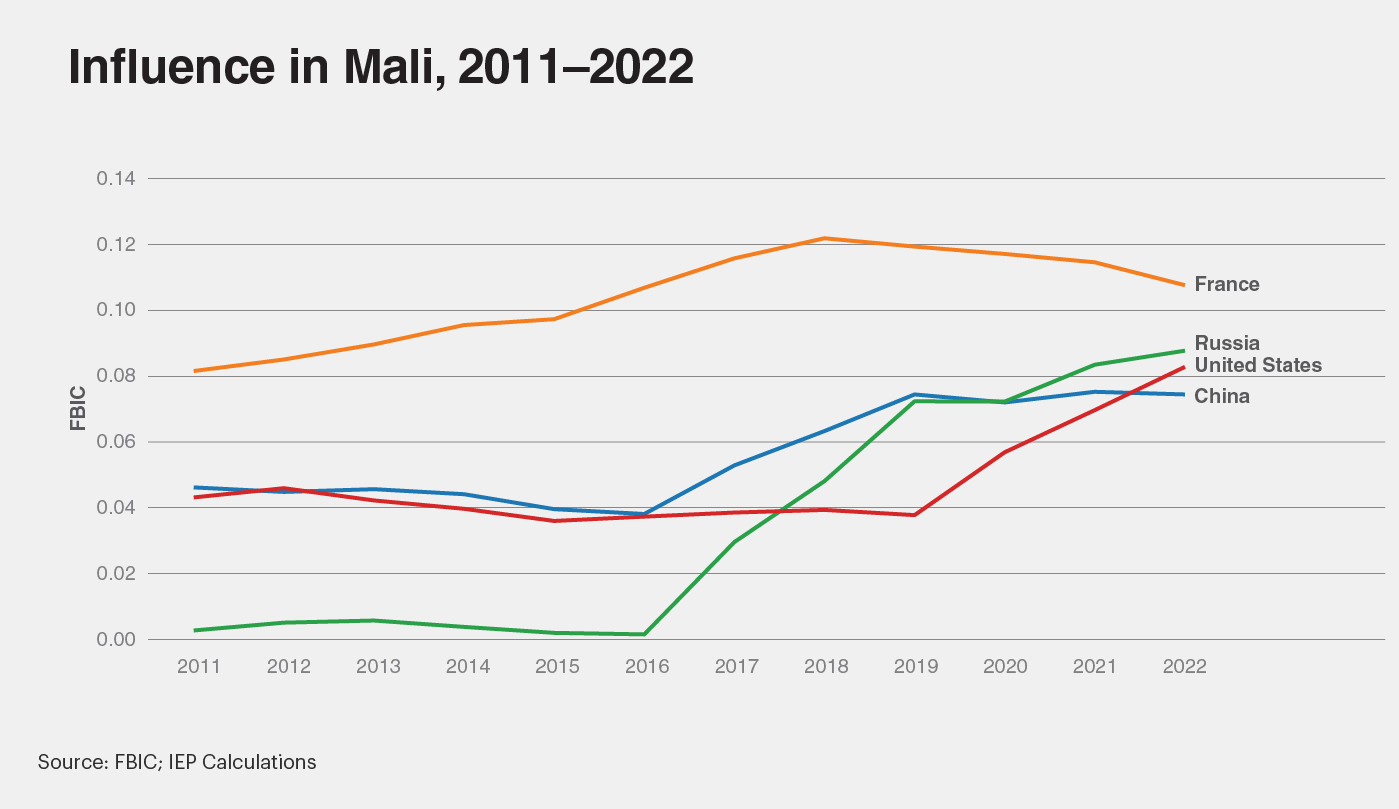
GTI Country Rank: 1 (country most impacted by Terrorism)
1,532 dead in 2024 from Terrorism
In 2024, Burkina Faso remained the country most severely impacted by terrorism for the second consecutive year. This year also marked the third successive year with terrorism-related fatalities exceeding 1,000 in the country. The northern and central eastern regions, adjacent to the borders with Mali and Niger, experienced more than two-thirds of all attacks. Centre-Nord registered the highest mortality rate, including the most severe attack of 2024, where JNIM militants killed between 200 and 600 individuals during an assault on soldiers and civilians constructing defensive trenches. JNIM continued as the predominant terrorist organization, responsible for nearly half of Burkina Faso’s attacks, with their activities and casualties increasing by over 50 percent. In contrast, IS operations decreased considerably, with only one attack in 2024 compared to eight in 2023, and terrorism deaths attributed to IS decreased by 91 per cent, from 175 to 15.
Burkina Faso experienced less direct intervention from foreign powers prior to 2023, except for French troops stationed in the country since 2009. Following the second coup in September 2022, Captain Ibrahim Traore began developing connections with Russia regarding military assistance and, in January 2023, requested the withdrawal of French troops and its ambassador. In January 2024, Russian private military personnel arrived in Ouagadougou, with the maximum presence reaching around 300. However, there has been minimal improvement in the country’s security situation. In July 2024, at least 100 of the ‘Bear Brigade’ military advisors departed from Burkina Faso to support Russian military responses to Ukraine’s capture of the Kursk region. Given the severity of the security crisis in Burkina Faso, the impact of Russian troops remains uncertain. Reports indicate that their primary function has been providing direct protection for junta leaders rather than actively participating in combat operations.
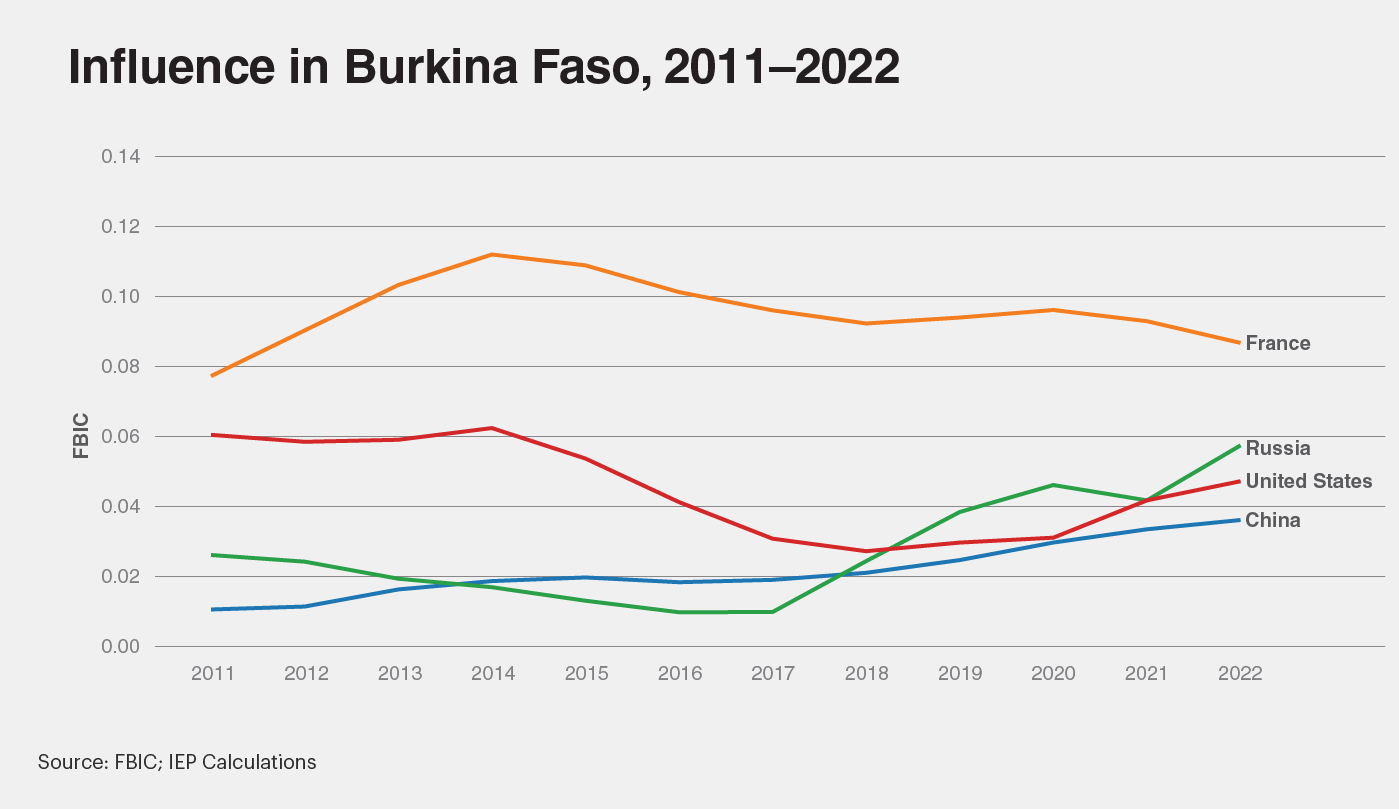
Beyond direct military support, Russian influence models have advanced their strategic objectives by shaping narratives supportive of the military and countering Western and UN influence. Russian social media and traditional media campaigns have been operational for over a decade throughout Africa, with recent focus on the Sahel. These efforts are extensive, with two Russian-linked influencers collectively reaching over 28 million social media followers. Their content is amplified through a network of hundreds of Russian-associated accounts and pages. Burkina Faso has experienced at least eight Russian-backed influence campaigns, matching the activity documented in Mali and the Central African Republic, both hosting significant Russian presence. Africa Corp has served as the principal instrument for orchestrating influence efforts in Africa, connected to nearly half of all Russian operations on the continent. Since Yevgeny Prigozhin’s death in 2023, Russia’s information activities are transitioning to new entities, including the Russian Africa Corps and the Africa Initiative News Agency. Russia has established its own media infrastructure with online, television, and radio channels. Russian embassies have reportedly facilitated the creation of African organizations to produce and disseminate information. The data illustrates the growth of Russia’s influence in the region, beginning in 2017 and steadily increasing in scope. The initiation and growth of Russian influence correlates with the increase of negative sentiment in Burkina Faso towards France.
US influence also increased during this period due to sustained economic aid, diplomatic engagement, and security cooperation. Despite political changes, including the January 2022 coup d’état, the US remained a key partner, providing significant development assistance and supporting efforts to counter extremism in the Sahel region. Politically, the US maintained diplomatic relations and supported efforts to restore stability following the coup, ensuring continued engagement. Military and other forms of assistance were frozen following the coup, suggesting that US influence may decrease in the future.
The influence landscape, similar to Mali, remains complex. China has steadily increased its influence, having achieved its goal of Burkina Faso terminating its cooperation with Taiwan in 2019. China has secured gold, copper, and nickel exploration licenses and has also established relations with the new government. While Chinese interests predominate along economic lines, there is a growing commitment to protect its interests against security threats. China has pledged 1 billion Yuan ($136 million) in military assistance to train 6,000 military personnel and 1,000 law enforcement members across Africa. This pledge, part of China’s Global Security Initiative, includes support for an African standby force to conduct peacekeeping and counterinsurgency operations. Such a development is consistent with China seeking to protect its influence, especially in regions where non-state armed actors affect its investments. The direct implications for security dynamics, particularly in a country like Burkina Faso, remain to be determined.
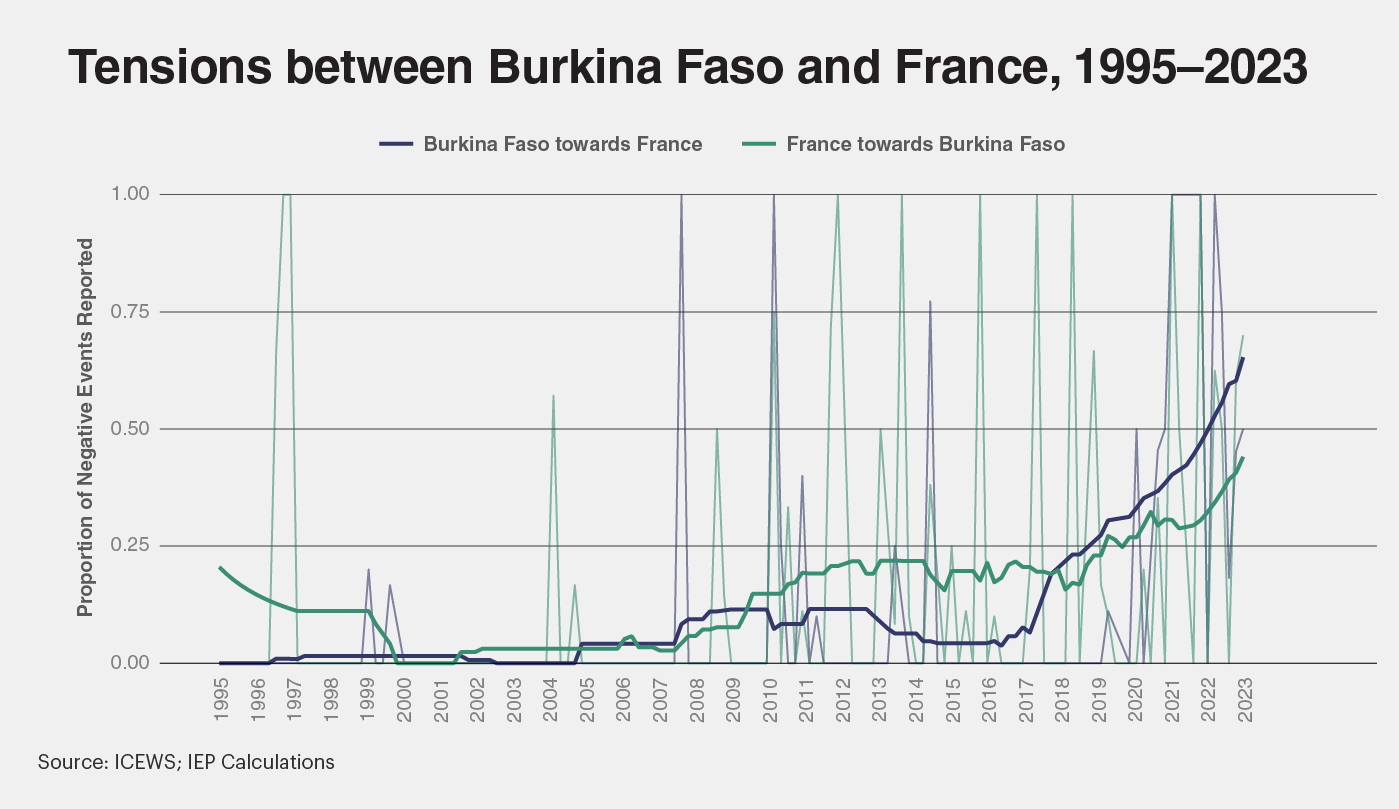
GTI Rank: 5 (5th country most affected by Terrorism)
930 dead from Terrorism in 2024
Terrorism in Niger reached unprecedented levels in 2024, continuing the upward trend observed in 2023. Attacks increased to 101, up from 62 in 2023, while fatalities nearly doubled to 930. Deaths among civilians tripled, and military casualties rose to 499, constituting over half of all fatalities and representing the highest military death toll from terrorism globally in 2024. The most significant attack occurred in the Tahoua region near the Malian border, where more than 300 gunmen killed 237 soldiers. While no organization has claimed responsibility, extremist groups are known to operate in the area. This incident was also the deadliest terrorist attack worldwide in 2024.
Tillaberi, situated in the tri-border area with Burkina Faso and Mali, remained the most affected region. It accounted for 63 percent of attacks and 67 per cent of fatalities in Niger, with violence extending into neighbouring regions such as Tahoua, where deaths increased fivefold. JNIM operations intensified significantly, with 13 attacks resulting in 109 deaths, representing a 14-fold increase in fatalities and the group’s highest impact in Niger to date. IS attacks maintained their previous frequency, though deaths attributed to them decreased by half to 108.
In July 2023, Niger underwent a military coup when the presidential guard overthrew President Mohamed Bazoum, with General Adourahmane Tchiani taking control. The coup leaders justified their actions by citing Bazoum’s failure to address extremist threats, although this explanation was widely viewed as a pretext, particularly given the relatively low frequency of terrorist attacks before the coup. The political change triggered a diplomatic situation, with regional powers threatening intervention and raising the risk of interstate conflict. By late 2023, Niger had distanced itself from Western allies, terminating security cooperation with the EU while exploring relationships with Russia. The government severed military ties with both France and the US. France withdrew its 1,500 troops in December 2023. In May 2024, the US was instructed to remove its forces from the country, including surrendering their $100 million Airbase 101 in Niamey and Airbase 201 in Agadez in northern Niger, which had become AFRICOM’s primary base for counterterrorism and drone operations in the region. The withdrawal was completed in September 2024, marking the end of both US and French presence in any of the three Sahelian states.
Niger and Burkina Faso also withdrew from the G5 Sahel following Mali’s earlier exit, affecting the alliance. Meanwhile, Russian influence campaigns increased before and after the coup. Unlike Mali and Burkina Faso, Niger had no prior diplomatic history with Russia or the Soviet Union, making this a notable shift. Since the coup, Russia has deployed military instructors and supplied military equipment, including aircraft, to Niger’s government.
As illustrated in the data, following the withdrawal of US and French forces, Niger has witnessed the highest number of terrorist attacks recorded since the inception of the GTI.
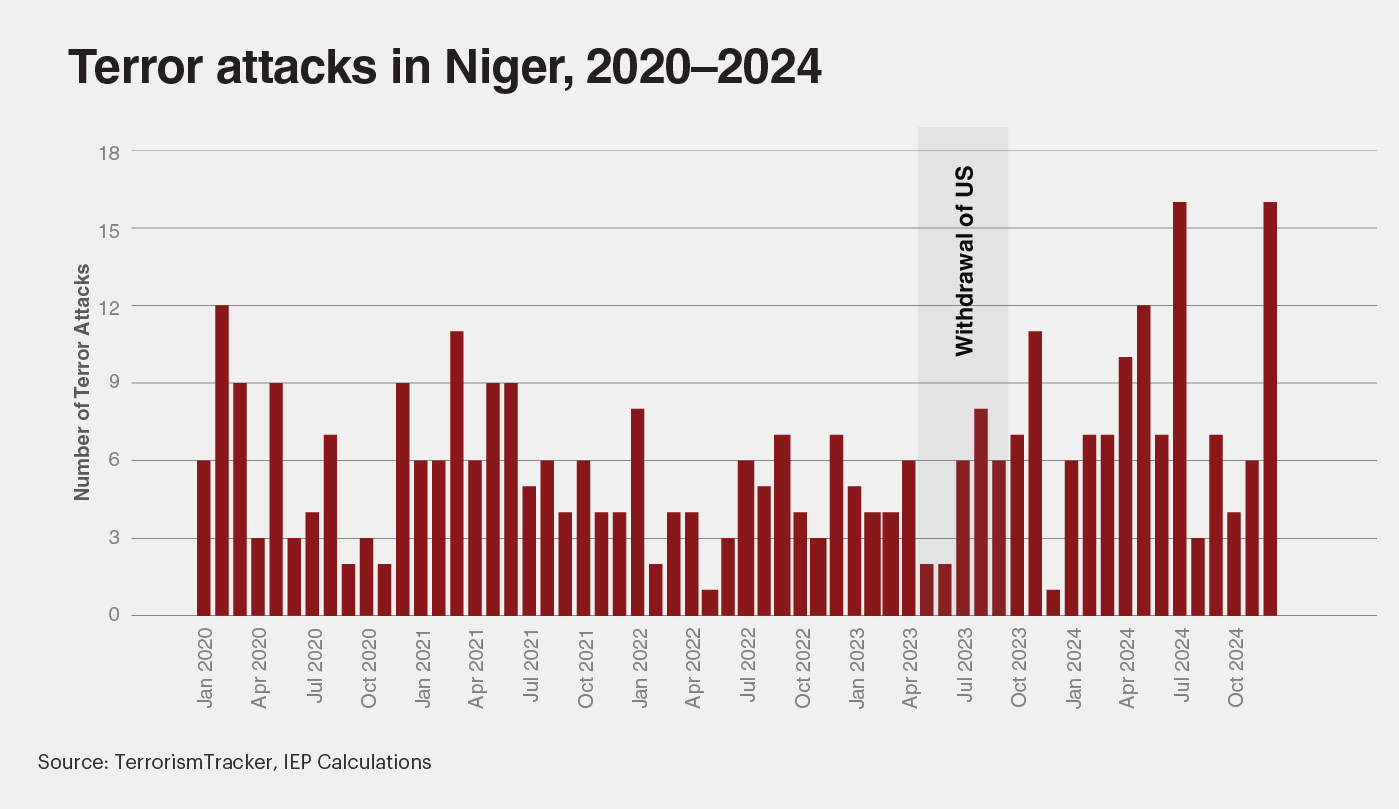
China and Russia, both significant uranium consumers, have been establishing agreements in Niger while French corporations such as Orano and Canada’s GoviEx have had their operational permits cancelled, losing access to their mining sites. Simultaneously, a predominantly Chinese-owned uranium mining enterprise is preparing to restart operations after a decade of inactivity. This coincides with forecasts suggesting China will need approximately four times more uranium between 2023 and 2040.
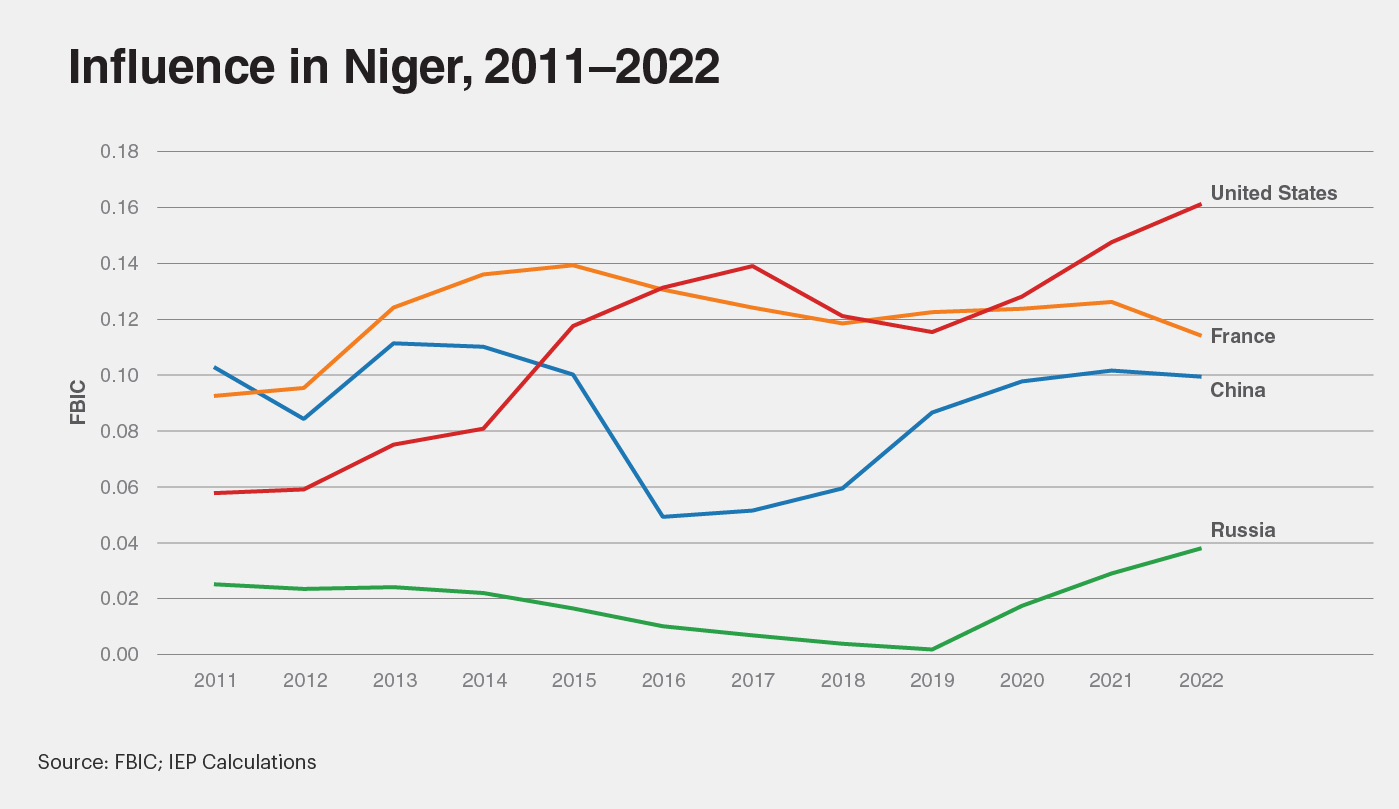
The geopolitical changes and evolving dynamics in the Sahel have generated uncertainty regarding their effect on terrorism. Counterterrorism collaboration between the Alliance of Sahelian States and neighbouring countries is now influenced by divisions among states aligned with Russia, the US or France. In January 2025, Mali, Burkina Faso and Niger announced a 5,000-strong joint military force to conduct counterterrorism operations in areas where terrorist groups operate across borders. Given the transnational nature of the counterterrorism challenge, effective operations require collaboration extending beyond the Alliance of Sahelian States to include North Africa, other Sahel states, and Coastal West Africa. Continued active involvement from the US and EU countries may remain important. This is necessary for disrupting the flow of illicit financing and weapons that sustain these organisations. Influential regional states like Nigeria will lead these efforts, and cooperation between the alliance and other neighbours such as Algeria and Libya will likely prove important. While Russian and Chinese influence is growing in the region, the European Union and US are unlikely to abandon their interests. With increasing conflict within the region and growing external competition for influence, the security outlook for the Central Sahel presents ongoing challenges.